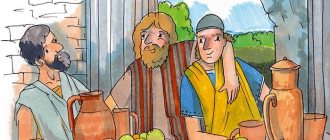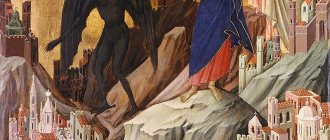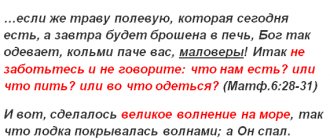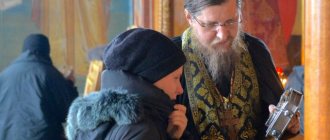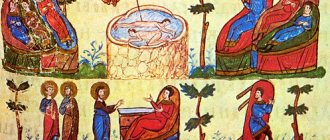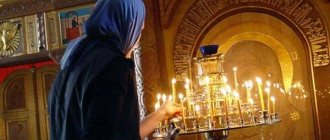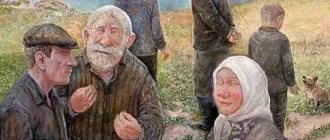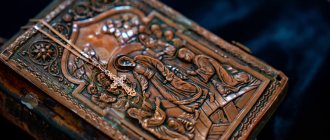Such a different gospel
The Greek word “Gospel” is translated into Russian as “good news.” In some English-speaking countries, the title of the story of the life of Jesus Christ is “Good News.” Translated into Russian this means “good news”. Orthodoxy has established a special order for how to read the Gospel every day.
To whom and when can the Gospel be read? What is a yearly cycle of reading the Gospel? What literature can help in reading and understanding the Gospel?
Gospel
Index of Gospel readings
Index of Gospel and Apostolic readings, for Sundays and holidays, for the whole year
The year in church time, relative to the reading of the Gospels and the Apostles, begins with the day of the Holy Resurrection of Christ and is divided into three circles.
The first circle contains eight weeks (or, in modern terms, weeks), starting from Easter to Pentecost, or Trinity week, inclusive; the second circle contains thirty-six weeks, begins with the first week (Sunday) after Pentecost and continues until Lent; The third circle includes the weeks of Great Lent. Contents: Weeks, Sundays from Easter to Trinity Weeks, Sundays after Trinity (Pentecost) and before the Preparatory weeks of Great Lent Preparatory weeks (Sundays) for Great Lent Great Lent Holy Week (Sunday of Christ’s Passion) Sunday gospels, which are read in the evening under Sunday Impermanent holidays The Eve of the Nativity of Christ (Christmas Eve). January 6th: Nativity of our Lord Jesus Christ). January 7th: Circumcision of the Lord. St. Basil the Great. January 14th: The Eve of Epiphany (Christmas Eve). January 18th: Epiphany, Epiphany. January 18th: Presentation of the Lord. February 15th: Annunciation of the Blessed Virgin Mary. April 7th: Nativity of St. John the Baptist. July 7th: St. the supreme apostles Peter and Paul. July 12th: Transfiguration of the Lord. August 19th: Dormition of the Blessed Virgin Mary. August 28: Beheading of John the Baptist. September 11th: Nativity of the Blessed Virgin Mary. September 21st: Exaltation of the Cross of the Lord. September 27th: Intercession of the Blessed Virgin Mary. October 14th: Kazan Icon of the Blessed Virgin Mary. November 4th: Council of the Archangel Michael and other ethereal forces. November 21st: Presentation of the Blessed Virgin Mary into the temple. December 4th: Common to the Saints
Weeks, Sundays from Easter to Trinity
Easter week:
Easter. The Bright Resurrection of Christ on lit.: Apostle: Acts. 1, 1-8. Ev.: In. 1, 1-17.
On the same day forever. Ev.: In. 20, 19-25.
Monday: Ap.: Acts. 1, 12-17, 21-26. Ev.: In. 1, 18-28.
Tuesday: Ap.: Acts. 2, 14-21. Ev.: Luke. 24, 12-35.
Wednesday: Ap.: Acts. 2, 22-36. Ev.: In. 1, 35-51.
Thursday: Ap.: Acts. 2, 38-43. Ev.: In. 3, 1-15.
Friday: Ap.: Acts. 3, 1-8. Phil. 2, 5-11. Ev.: In. 2, 12-22.
Saturday: Ap.: Acts. 3, 11-16. Ev.: In. 3, 22-33
Sunday 2nd after Easter, about Thomas:
In the evening before Sunday: Ev.: Matt. 28, 16-20.
In the morning on lit. or image: Ap.: Acts. 5, 12-20. Ev.: In. 20, 19-31.
Sunday 3rd after Easter, about the myrrh-bearers:
In the evening before Sunday: Ev.: Mk. 16, 9-20.
In the morning on lit. or image: Ap.: Acts. 6, 1-7. Ev.: Mk. 15, 43-16, 8.
Sunday 4th after Easter, about the paralytic:
In the evening before Sunday: Ev.: Luke. 24, 1-12.
In the morning on lit. or image: Ap.: Acts. 9, 32-42. Ev.: In. 5, 1-15.
Sunday 5th after Easter, about the Samaritan woman:
In the evening before Sunday: Ev.: John. 20, 1-10.
In the morning on lit. or image: Ap.: Acts. 11, 19-26, 29-30. Ev.: In. 4, 5-42.
Sunday 6th after Easter, about the blind man:
In the evening before Sunday: Ev.: John. 20, 11-18.
In the morning on lit. or image: Ap.: Acts. 16, 16-34. Ev.: In. 9, 1-38.
Thursday, Ascension of the Lord:
In the evening before Sunday: Ev.: Mk. 16, 9-20.
In the morning on lit. or image: Ap.: Acts. 1, 1-12. Ev.: Luke. 24, 36-53.
Sunday 7th after Easter, Holy Fathers of the 1st Ecumenical Council:
In the evening before Sunday: Ev.: John. 21, 1-14.
In the morning on lit. or image: Ap.: Acts. 20, 16-18, 28-36. Ev.: In. 17, 1-13.
Saturday, memorial:
AP: Acts. 28, 1-31; and for repose: 1 Thess. 4, 13-17. Ev.: In. 21, 15-25; and for repose: John. 5, 24-30.
Sunday 8th after Easter. Trinity Day (Pentecost):
In the evening before Sunday: Ev.: John. 20, 19-23.
In the morning on lit. or image: Ap.: Acts. 2, 1-11. Ev.: In. 7, 37-52; 8, 12.
Weeks, Sundays after Trinity (Pentecost) and before the Preparatory Weeks of Great Lent
1st Sunday after Pentecost, All Saints:
In the evening before Sunday: Ev.: Matt. 28, 16-20.
In the morning on lit. or image: Ap.: Heb. 11, 33-12, 2. Ev.: Matt. 10, 32-33, 37-38; 19, 27-30.
2nd Sunday after Pentecost:
In the evening before Sunday: Ev.: Mk. 16, 1-8.
In the morning on lit. or image: Ap.: Rome. 2, 10-16. Ev.: Matt. 4, 18-23.
3rd Sunday after Pentecost:
In the evening before Sunday: Ev.: Mk. 16, 9-20.
In the morning on lit. or image: Ap.: Rome. 5, 1-10. Ev.: Matt. 6, 22-33.
Sunday 4th after Pentecost:
In the evening before Sunday: Ev.: Luke. 24, 1-12.
In the morning on lit. or image: Ap.: Rome. 6, 18-23. Ev.: Matt. 8, 5-13.
Sunday 5th after Pentecost:
In the evening before Sunday: Ev.: Luke. 24, 12-35.
In the morning on lit. or image: Ap.: Rome. 10, 1-10. Ev.: Matt. 8, 28-9, 1.
Sunday 6th after Pentecost:
In the evening before Sunday: Ev.: Luke. 24, 36-53.
In the morning on lit. or image: Ap.: Rome. 12, 6-14. Ev.: Matt. 9, 1-8.
Sunday 7th after Pentecost:
In the evening before Sunday: Ev.: John. 20, 1-10.
In the morning on lit. or image: Ap.: Rome. 15, 1-7. Ev.: Matt. 9, 27-35.
Sunday 8th after Pentecost:
In the evening before Sunday: Ev.: John. 20, 1 1-18.
In the morning on lit. or image: Ap.: 1 Cor. 1, 10-18. Ev.: Matt. 14, 14-22.
Sunday 9th after Pentecost:
In the evening before Sunday: Ev.: John. 20, 19-31.
In the morning on lit. or image: Ap.: 1 Cor. 3, 9-17. Ev.: Matt. 14, 22-34.
Sunday 10th after Pentecost:
In the evening before Sunday: Ev.: John. 21, 1-14.
In the morning on lit. or image: Ap.: 1 Cor. 4, 9-16. Ev.: Matt. 17, 14-23.
Sunday 11th after Pentecost:
In the evening before Sunday: Ev.: John. 21, 15-25.
In the morning on lit. or image: Ap.: 1 Cor. 9, 2-12. Ev.: Matt. 18, 23-35.
Sunday 12th after Pentecost:
In the evening before Sunday: Ev.: Matt. 28, 16-20.
In the morning on lit. or image: Ap.: 1 Cor. 15, 1-11. Ev.: Matt. 19, 16-26.
Sunday 13th after Pentecost:
In the evening before Sunday: Ev.: Mk. 16, 1-8.
In the morning on lit. or image: Ap.: 1 Cor. 16, 13-24. Ev.: Matt. 21, 3342.
Sunday 14th after Pentecost:
In the evening before Sunday: Ev.: Mk. 16, 9-20.
In the morning on lit. or image: Ap.: 2 Cor. 1, 21-2. 4. Ev.: Matt. 22, 1-14.
Sunday 15th after Pentecost:
In the evening before Sunday: Ev.: Luke. 24, 1-12.
In the morning on lit. or image: Ap.: 2 Cor. 4, 6-15. Ev.: Matt. 22, 3546.
Sunday 16th after Pentecost:
In the evening before Sunday: Ev.: Luke. 24, 12-35.
In the morning on lit. or image: Ap.: 2 Cor. 6, 1-10. Ev.: Matt. 25, 14-30.
Sunday 17th after Pentecost:
In the evening before Sunday: Ev.: Luke. 24, 36-53.
In the morning on lit. or image: Ap.: 2 Cor. 6, 16-7, 1. Ev.: Matt. 15, 21-28.
Sunday 18th after Pentecost:
In the evening before Sunday: Ev.: John. 20, 1-10.
In the morning on lit. or image: Ap.: 2 Cor. 9, 6-11. Ev.: Luke. 5, 1-11.
Sunday 19th after Pentecost:
In the evening before Sunday: Ev.: John. 20, 11-18.
In the morning on lit. or image: Ap.: 2 Cor. 11, 31-12, 9. Ev.: Luke. 6, 31-36.
Sunday 20th after Pentecost:
In the evening before Sunday: Ev.: John. 20, 19-31.
In the morning on lit. or image: Ap.: Gal. 1, 11-19. Ev.: Luke. 7, 11-16.
Sunday 21st after Pentecost:
In the evening before Sunday: Ev.: John. 21, 1-14.
In the morning on lit. or image: Ap.: Gal. 2, 16-20. Ev.: Luke. 8, 5-15.
Sunday 22nd after Pentecost:
In the evening before Sunday: Ev.: John. 21, 15-25.
In the morning on lit. or image: Ap.: Gal. 6, 11-18. Ev.: Luke. 16, 19-31.
Sunday 23rd after Pentecost:
In the evening before Sunday: Ev.: Matt. 28, 16-20.
In the morning on lit. or image: Ap.: Eph. 2, 4-10. Ev.: Luke. 8, 26-39.
Sunday 24th after Pentecost:
In the evening before Sunday: Ev.: Mk. 16, 1-8.
In the morning on lit. or image: Ap.: Eph. 2, 14-22. Ev.: Luke. 8, 41-56.
Sunday 25th after Pentecost:
In the evening before Sunday: Ev.: Mk. 16, 9-20.
In the morning on lit. or image: Ap.: Eph. 4, 1-6. Ev.: Luke. 10, 25-37.
Sunday 26th after Pentecost:
In the evening before Sunday: Ev.: Luke. 24, 1-12.
In the morning on lit. or image: Ap.: Eph. 5, 9-19. Ev.: Luke. 12, 16-21.
Sunday 27th after Pentecost:
In the evening before Sunday: Ev.: Luke. 24, 12-35.
In the morning on lit. or image: Ap.: Eph. 6, 10-17. Ev.: Luke. 13, 10-17.
Sunday 28th after Pentecost:
In the evening before Sunday: Ev.: Luke. 24, 36-53.
In the morning on lit. or image: App.: Col. 1, 12-18. Ev.: Luke. 14, 16-24.
Sunday 29th after Pentecost:
In the evening before Sunday: Ev.: John. 20, 1-10.
In the morning on lit. or image: App.: Col. 3, 4-11. Ev.: Luke. 17, 12-19.
Sunday 30th after Pentecost:
In the evening before Sunday: Ev.: John. 20, 11-18.
In the morning on lit. or image: App.: Col. 3, 12-16. Ev.: Luke. 18, 18-27.
Sunday 31st after Pentecost:
In the evening before Sunday: Ev.: John. 20, 19-31.
In the morning on lit. or image: Ap.: 1 Tim. 1, 15-17. Ev.: Luke. 18, 35-43.
Sunday 32nd after Pentecost:
In the evening before Sunday: Ev.: John. 21, 1-14.
In the morning on lit. or image: Ap.: 1 Tim. 4, 9-15. Ev.: Luke. 19, 1-10.
Preparatory weeks (Sundays) for Lent
Sunday about the publican and the Pharisee:
In the evening before Sunday: Ev.: Sunday.
In the morning on lit. or image: Ap.: 2 Tim. 3, 10-15. Ev.: Luke. 18, 10-14.
Sunday about the Prodigal Son:
In the evening before Sunday: Ev.: Sunday.
In the morning on lit. or image: Ap.: 1 Cor. , 6, 12-20. Ev.: Luke. 15, 11-32.
Saturday, memorial:
Ap.: 1 Cor. 10, 23-28. Ev.: Luke. 21, 8-9, 25-27, 33-36; and for repose : Ap.: 1 Thess. 4, 13-17. Ev.: In. 5, 24-30.
Sunday about the Last Judgment:
In the evening before Sunday: Ev.: Sunday.
In the morning on lit. or image: Ap.: 1 Cor. 8, 8-9, 2. Ev.: Matt. 25, 31-46.
Sunday of Adam's expulsion from Paradise:
In the evening before Sunday: Ev.: Sunday.
In the morning on lit. or image: Ap.: Rome. 13, 11-14, 4. Ev.: Matt. 6, 14-21.
Lent
1st Saturday of Great Lent, St. Theodore Tyrone:
In the morning on lit. or image: Ap.: Heb. 1, 1-12. To the Saint: 2 Tim. 2, 1-10. Ev.: Mk. 2, 233, 5. And to the saint : John. 15, 17-16, 2.
1st Sunday of Great Lent, Triumph of Orthodoxy:
In the evening before Sunday: Ev.: Sunday.
In the morning on lit. or image: Ap.: Heb. 11, 24-26, 32-12, 2. Ev.: John. 1, 43-51.
2nd Saturday of Great Lent, memorial:
Ap.: Heb. 3, 12-16. And for repose: 1 Thess. 4, 13-17. Ev.: Mk. 1, 35-44. And for repose: John. 5, 24-30.
2nd Sunday of Great Lent, St. Gregory Palamas:
In the evening before Sunday: Ev.: Sunday.
In the morning on lit. or image: Ap.: Heb. 1, 10-2, 3. And to the saint: Heb. 7, 26-8, 2. Ev.: Mark. 2, 1-12. And to the saint: John 10:9-16.
3rd Saturday of Great Lent, memorial:
In the morning on lit. or image: Ap.: Heb. 10, 32-38. And for repose: 1 Thess. 4, 13-17. Ev.: Mk. 2, 14-17. And for repose: John. 5, 24-30.
3rd Sunday of Lent, Worship of the Cross:
In the evening before Sunday: Ev.: Sunday.
In the morning on lit. or image: Ap.: Heb. 4, 14-5, 6. Ev.: Mark. 8, 34-9, 1.
4th Saturday of Lent, memorial:
Ap.: Heb. 6, 9-12. And for repose: 1 Cor. 15, 47-57. Ev.: Mk. 7, 31-37. And for repose: John. 5, 24-30.
4th Sunday of Great Lent, Venerable John Climacus:
In the evening before Sunday: Ev.: Sunday.
In the morning on lit. or image: Ap.: Heb. 6, 13-20. And to the saint: Eph. 5.9-19. Ev.: Mk. 9, 17-31. And to the saint: Matt. 4, 25-5, 12.
Saturday 5th of Lent, Akathist:
Ap.: Heb. 9, 24-28. And the Mother of God: Heb. 9, 1-7. Ev.: Mk. 8, 27-31. And to the Mother of God: Lk. 10, 38-42; 11, 27-28.
5th Sunday of Great Lent, Venerable Mary of Egypt:
In the evening before Sunday: Ev.: Sunday.
In the morning on lit. or image: Ap.: Heb. 9, 11-14. And the venerable one: Gal. 3, 23-29. Ev.: Mk. 10, 32-45. And the venerable one: Lk. 7, 36-50.
Saturday 6th of Lent, Lazareva:
Ap.: Heb. 12, 28-13, 8. Ev.: John. 11, 1-45.
Sunday 6th of Lent, Palm or flowering Sunday. Entry of the Lord into Jerusalem:
In the evening before Sunday: Ev.: Matt. 21, 1-11, 15-17.
In the morning on lit. or image: Ap.: Phil. 4, 4-9. Ev.: In. 12, 1-18.
Holy Week (Sunday of the Passion of Christ)
Maundy Monday:
Monday evening: Ev.: Matt. 21, 18-43.
In the morning on lit. or image: Ev.: Matt. 24, 3-35.
Maundy Tuesday:
Tuesday evening: Ev.: Matt. 22, 15-23, 39.
In the morning on lit. or image: Ev.: Matt. 24, 36-26, 2.
Great Wednesday:
Wednesday evening: Ev.: John. 12, 17-50.
In the morning on lit. or image: Ev.: Matt. 26, 6-16.
Maundy Thursday:
Thursday evening: Ev.: Luke. 22, 1-39.
In the morning on lit. or image: Ap.: 1 Cor. 11, 23-32. Ev.: Matt. 26, 1-20. In. 13, 3-17. Mf. 26, 21-39. OK. 22, 43-45. Mf. 26, 40-27, 2.
Maundy Thursday. In the evening, the 12 Gospels of the holy sufferings of the Lord God and our Savior Jesus Christ are read:
- Ev. 1.: In. 13, 31-18, 1.
- Ev. 2.: In. 18, 1-28.
- Ev. 3.: Matt. 26, 57-75.
- Ev. 4.: In. 18, 28-19, 16.
- Ev. 5.: Matt. 27, 3-32.
- Ev. 6.: Mk. 15, 16-32.
- Ev. 7.: Matt. 27, 33-64.
- Ev. 8.: Luke. 23, 3249.
- Ev. 9.: In. 19, 25-37.
- Ev. 10.: Mk. 15, 43-47.
- Ev. 11.: In. 19, 38-42.
- Ev. 12.: Matt. 27, 62-66.
Good Friday morning. Clock sequence:
- Hour 1: Ap.: Gal. 6, 14-18. Ev.: Matt. 27, 1-56.
- Hour 3: Ap.: Rome. 5, 6-11. Ev.: Mk. 15, 16-41.
- Hour 6: Ap.: Heb. 2, 11-18. Ev.: Luke. 23, 32-49.
- Hour 9: Ap.: Heb. 10, 19-31. Ev.: In. 18, 28-19, 37.
Good Friday evening:
Ap.: 1 Cor. 1, 18-2, 2. Ev.: Matt. 27, 1-38. OK. 23, 39-43. Mf. 27, 39-54. In. 19, 31-37. Mf. 27, 55-61.
Holy Saturday:
In the evening on Saturday, according to the doxology: Ap.: 1 Cor. 5, 6-8. Gal. 3, 13-14. Ev.: Matt. 27, 62-66.
In the morning on lit. or image: Ap.: Rome. 6, 3-11. Ev.: Matt. 28, 1-20.
Sunday Gospels, read on Sunday evening
(They read one gospel for each Sunday. And when they read all 11 gospels, then they start again)
- Mf. 28, 16-20.
- Mk. 16, 1-8.
- Mk. 16, 9-20.
- OK. 24, 1-12.
- OK. 24, 12-35.
- Luke 24. 3-53.
- In. 20, 1-10.
- In. 20, 11-18.
- In. 20, 19-31.
- In. 21, 1-14.
- In. 21, 15-25.
Holidays are permanent
The eve of the Nativity of Christ (Christmas Eve). January 6th:
In the morning on lit. or image: Ap.: Heb. 1, 1-12. Ev.: Luke. 2, 1-20.
If on Saturday or Sunday: Ap.: Gal. 3, 15-22. Ev.: Matt. 13, 31-36.
Nativity of our Lord Jesus Christ). January 7th:
In the evening of the holiday: Ev.: Matt. 1, 18-25.
In the morning on lit. or image: Ap.: Gal. 4, 4-7. Ev.: Matt. 2, 1-12.
Circumcision of the Lord. St. Basil the Great. January 14th:
In the evening before the holiday: Ev.: John. 10, 1-9.
In the morning on lit. or image: App.: Col. 2, 8-12. Ev.: Luke. 2, 20-21, 40-52. And to the saint: Ap.: Heb. 7, 26-8, 2. Ev.: Luke. 6, 17-23.
The Eve of Epiphany (Christmas Eve). January 18th:
On lit. or image: Ap.: 1 Cor. 9, 19-27. If there is no fasting: 1 Cor. 10, 14. Ev.: Luke. 3, 1-18.
Epiphany, Epiphany. January 18th:
In the evening before the holiday: Ev.: Mk. 1, 9-11.
In the morning on lit. or image: Ap.: Tit. 2, 11-14; 3, 4-7. Ev.: Matt. 3, 13-17.
Meeting of the Lord. February 15th:
In the evening of the holiday: Ev.: Luke. 2, 25-32.
In the morning on lit. or image: Ap.: Heb. 7, 7-17. Ev.: Luke. 2, 22-40.
Annunciation of the Blessed Virgin Mary. April 7th:
In the evening of the holiday: Ev.: Luke. 1. 39-49, 56.
In the morning on lit. or image: Ap.: Heb. 2, 11-18. Ev.: Luke. 1, 24-38.
Christmas of St. John the Baptist. July 7th:
In the evening of the holiday: Ev.: Luke. 1, 24-25, 57-68, 76, 80.
In the morning on lit. or image: Ap.: Rome. 13, 12-14, 4. Ev.: Luke. 1, 5-25, 57-68, 76, 80.
St. the supreme apostles Peter and Paul. July 12th:
In the evening before the holiday: Ev.: John. 21, 15-25.
In the morning on lit. or image: Ap.: 2 Cor. 11, 21-12, 9. Ev.: Matt. 16, 13-19.
Transfiguration. August 19th:
In the evening of the holiday: Ev.: Luke. 9, 28-36.
In the morning on lit. or image: Ap.: 2 Pet. 1, 10-19. Ev.: Matt. 17, 1-9.
Dormition of the Blessed Virgin Mary. August 28th:
In the evening of the holiday: Ev.: Luke. 1, 39-49, 56.
In the morning on lit. or image: Ap.: Phil. 2, 5-11. Ev.: Luke. 10, 38-42; 11, 27-28.
The beheading of John the Baptist. September 11th:
In the evening of the holiday: Ev.: Matt. 14, 1-13.
In the morning on lit. or image: Ap.: Acts. 13, 25-32. Ev.: Mark, 6, 14-30.
Nativity of the Blessed Virgin Mary. September 21st:
In the evening of the holiday: Ev.: Luke. 1, 39-49, 56.
In the morning on lit. or image: Ap.: Phil. 2, 5-11. Ev.: Luke. 10, 38-42; 11, 27-28.
Raising the Cross of the Lord. September 27th:
In the evening before the holiday: Ev.: John. 12, 28-36.
In the morning on lit. or image: Ap.: 1 Cor. 1, 18-24. Ev.: In. 19, 6-11, 13-20, 25-28, 30-35.
Protection of the Blessed Virgin Mary. October 14th:
Service of the Virgin Mary.
Kazan Icon of the Blessed Virgin Mary. November 4th:
Service of the Virgin Mary.
Cathedral of Archangel Michael and other ethereal forces. November 21st:
Service of the ethereal.
Presentation of the Blessed Virgin Mary into the temple. December 4th:
In the evening of the holiday: Ev.: Luke 1, 39-49, 56.
In the morning on lit. or image: Ap.: Heb. 9, 1-7. Ev.: Luke. 10, 38-42; 11, 27-28.
Common Saints
Service to the Blessed Virgin Mary:
In the evening of the holiday: Ev.: Luke. 1, 39-49, 56.
In the morning on lit. or image: Ap.: Phil. 2, 5-11; or Heb. 9, 1-7. Ev.: Luke. 10, 38-42; 11, 27-28.
Service to the holy heavenly ethereal forces:
In the morning on lit. or image: Ap.: Heb. 2, 2-10. Ev.: Luke. 10, 16-21; or Matt. 13, 24-30, 36-43.
Service to the Holy Prophets, general:
In the morning on lit. or image: Ap.: 1 Cor. 14, 20-25; or Heb. 6, 13-20, or James. 5, 10-20. Ev.: Matt. 23, 29-39; or Luke. 11, 47-54.
Service to the Holy Apostles, general:
In the morning on lit. or image: Ap.: 1 Cor. 4, 9-16. Ev.: Luke. 10, 1-15; or 10, 16-21.
Service to the saint, alone:
In the morning on lit. or image: Ap.: Heb. 7, 26-3, 2. Ev.: John. 10, 9-16.
Service to the saints, general:
In the evening before the holiday: Ev.: John. 10, 1-9.
In the morning on lit. or image: Ap.: Heb. 13, 17-21. Ev.: Matt. 5, 14-19; or In. 10, 9-16.
Service to the saints and holy fools for Christ's sake:
In the morning on lit. or image: Ap.: Gal. 5, 22-6, 2. Ev.: Matt. 11, 27-30, or Luke. 6, 17-23.
Service to the martyr, alone:
In the morning on lit. or image: Ap.: 2 Tim. 2, 1-10. Ev.: Luke. 12, 2-12; or In. 15, 17-16, 2.
Service to the martyrs, general:
In the morning on lit. or image: Ap.: Rome. 8, 28-39; or Heb. 11, 33-40. Ev.: Matt. 10, 16-22; or Luke. 21, 12-19.
Service to the holy martyr, one:
In the morning on lit. or image: Ap.: Heb. 13, 7-16. Ev.: Luke. 12, 32-40.
Service to the Hieromartyrs, general:
In the morning on lit. or image: Ap.: Heb. 5, 4-10, or Phil. 3, 20-4, 3. Ev.: Luke. 6, 17-23; or 10, 22-24; or 14, 25-35.
Service to the Venerable Martyr, One:
In the morning on lit. or image: Ap.: 2 Tim. 1, 8-18. Ev.: Mk. 8, 34-9, 1
Service to the Venerable Martyrs, general:
In the morning on lit. or image: Ap.: Rome. 8, 28-39. Ev.: Matt. 10, 32-33, 37-38; 19, 27-30, or Luke. 12, 8-12.
Service to the Holy Martyrs, general:
In the morning on lit. or image: Ap.: 2 Cor. 6, 1-10, or Gal. 3, 23-29. Ev.: Matt. 15, 21-28; or Mk. 5, 24-34.
Service to Reverend Women, general:
In the morning on lit. or image: Ap.: Gal. 3, 23-29. Ev.: Matt. 25, 1-13.
Service to Confessors:
In the morning on lit. or image: Ap.: Eph. 6, 10-17. Ev.: Luke. 12, 8-12.
Service to the unmercenary:
In the morning on lit. or image: Ap.: 1 Cor. 12, 27-13, 8. Ev.: Matt. 10, 1, 5-8.
Gospel for every day - for what?
The New Testament consists of the Gospels, the Epistles of the Holy Apostles, the Acts of the Holy Apostles and the Revelation of John the Theologian. The four Gospels (Matthew, Mark, Luke, John) are the central part of the New Testament. They are named after the apostles who wrote down the story of the earthly life of Jesus Christ. They all tell the same story. But their stories differ in style, semantic accents, depth and focus.
So, for example, Mark addresses the Roman pagan youth. His text contains few details, a lot of factual information, the narrative develops clearly and rapidly. John pays less attention to facts. Indeed, by the time his book was written, the events had already been described in detail by other evangelists. He also reveals the mystical, deep essence of the Savior’s coming to earth.
Why are there four Gospels? In the Old Testament, through the prophet Ezekiel (1:4-25), the Lord reveals four animals with human faces. The Holy Fathers Irenaeus of Lyon, Jerome of Stridon, Gregory Dvoeslov consider this episode to be a prophecy. According to their interpretation, it reveals the symbolic meaning of each of the 4 Gospels. In the Bible, the number four denotes spatial completeness. Today we see this in iconography: the Angel (from Matthew) is the image of Christ as a perfect Man. Lion (from Mark) is the image of the King. Taurus (from Luke) is the image of God who sacrificed Himself for the sins of all people. Eagle (from John) - the image of the Conqueror of death.
@Κύριεἐλέησον.με
All texts for today are presented in accordance with the instructions of the Typikon. Special readings are designated only for the Great and Vigil holidays.
Reading order: Tuesday, March 1, 2022 (February 16, Old Style) Cheese Week (Maslenitsa) Martyr. Pamphilus of the presbyter, Valens the deacon, Paul, Porphyry, Seleucia, Theodulus, Julian, Samuel, Elijah, Daniel, Jeremiah, Isaiah (308-309)
Liturgical instructions for clergy and clergy
Gospel and Apostolic readings
At the liturgy
Apostle
Jude 1:1 Judas, the servant of Jesus Christ, brother of James, to those who are sanctified in God the Father, called by Jesus Christ: Jude 1:2 May mercy and peace and love be multiplied to you. Jude 1:3 Beloved, having made every effort to write to you about your common salvation, I have the need to write to you, praying that you strive for the faithful faith of the one saints. Jude 1:4 For some men, who of old were ordained for this condemnation, have turned to wickedness, turning the grace of our God into defilement, and rejecting the only Master God and our Lord Jesus Christ. Jude 1:5 Now I would remember you, who know this only to you, that the Lord saved the people from the land of Egypt, and destroyed the followers of the unbelievers: Jude 1:6 But the angels did not keep their rulership, but left their habitation for the judgment of the great day in chains observed eternally under darkness. Jude 1:7 Just as Sodom and Gomorrah and the cities around them, having committed adultery in like manner and following other flesh, are presented as a testimony to the eternal fire of judgment; dominions are swept away, but glory is blasphemed (they do not tremble). Jude 1:9 Michael the Archangel, when he was discussing with the devil about the body of Moses, did not dare to bring blasphemy into judgment, but said: The Lord rebuke you. Jude 1:10 But these, since they are ignorant, blaspheme: but because they are by nature like a dumb animal, they are filthy.
Gospel
Luke 22:39 And he went out, according to the custom, to the Mount of Olives: and his disciples walked after him. Luke 22:40 When he was there, he said to them, “Pray, so that you will not fall into misfortune.” Luke 22:41 And thyself departed from them as by casting a stone, and bowed the knee, praying, Luke 22:42 saying: Father, if thou wilt to take away this cup from me: neither is my will, but thine be done. Luke 22:45 And having risen from prayer (and) came to the disciples, you found them sleeping out of sorrow Luke 22:46 and said to them: Why are you sleeping? Stand up and pray, so that you will not fall into misfortune. Luke 22:47 Again I said unto him, Behold, the people, and he that is called Judas, one of ten, went before them, and come unto Jesus, and kiss him. He gave them this sign: Even if I kiss Him, He is the One. Luke 22:48 And Jesus said to him: Judas, wilt thou betray the Son of Man with a kiss? Luke 22:49 And those who were with Him saw what happened, and said to Him: Lord, what if we strike with a knife? Luke 22:50 And one of them struck one of the bishop's servants and cut off his right ear. Luke 22:51 Jesus answered and said, Leave it to this. And touch his ear and heal him. Luke 22:52 Jesus spoke to the bishops and church leaders and elders who came to Nan: Why did you go out against the robber with weapons and swords? Luke 22:53 I am with you all the days in the church, not laying my hand upon Me: but behold, this is your time and a dark region. Luke 22:54 And she saw Him and brought Him into the court of the bishops. Peter followed from afar. Luke 22:55 And those who lit fire in the midst of the court, and those who sat together with them, Peter sat in the midst of them. Luke 22:56 When a certain servant woman saw him, sitting in the light, and looking up, she said, “This one too is with Him.” Luke 22:57 And he denied Him, saying, Woman, I do not know Him. Luke 22:58 And little by little others saw him and said, “Thou art also of them.” Peter said: man, I am not. Luke 22:59 And as one hour passed by, a certain man stood strong and said, “Truly this one also is with Him: for He is a Galilean.” Luke 22:60 But Peter said: O man, we do not know what you are saying. And abiye, I still say to him, shout the loops. Luke 22:61 And the Lord turned and looked at Peter: and Peter would remember the word of the Lord as he had spoken to him, because first he would not even cry out, having denied Me three times. Luke 22:62 And he went out weeping bitterly. Luke 22:63 And the men holding Jesus cursed at Him, striking Him: Luke 22:64 And covering Him, they struck Him in the face and asked Him, saying: Prophets, who is it that struck You? Luke 22:65 And Nan spoke many blasphemous words. Luke 22:66 And as the day came to pass, the elders of the people and the bishops and the scribes gathered together, and brought Him to their assembly, Luke 22:67 saying: Are you the Christ? Rts to us. And I said to them: If I give you a river, you do not have faith: Luke 22:68 But even if I ask, you do not answer Me, neither do you let me go: Luke 22:69 From now on the Son of Man will sit on the right hand of the power of God. Luke 22:70 Having decided everything: Art thou then the Son of God? He spoke to them: You say that I am. Luke 22:71 And they decided: What else do we require to testify? We ourselves heard from His mouth. Luke 23:1 And the whole multitude of them stood up, bringing Him to Pilate,
Daily Gospel Reading
The Holy Gospel cannot be fully comprehended by reading it once as a literary text. Any miracle, conversation or parable described in this Book must be comprehended throughout life. Saint Theophan the Recluse calls us to read a certain passage of the Gospel daily and thoughtfully:
“In the morning it’s good to read the Gospel and the Apostle... And not just read, but come up with such a thought that you can spend the whole day with it.”
The rhythm of modern life does not allow a person to fully immerse himself in his spiritual life. At the same time, the truths of the Gospel are the answer to various questions that constantly confront us. This is why it is important to read the Gospel every day. The Holy Scripture reveals the Will of God to people and indicates the direction of life.
In one of his interviews, Metropolitan Longin of Saratov and Volsk said that reading the Gospel is not just an integral part of Christian life, but its basis. The Gospel is the primary source, it is the foundation, the word of God, which must constantly resound in the human heart. That is why the Holy Scripture, and above all the New Testament, is a must-read for a Christian.
Daily reading of the Word of God enriches the human soul. Saint Ignatius (Brianchaninov) said:
“Whoever explains the Gospel and all Scripture arbitrarily: thereby rejects the interpretation of it by the Holy Fathers and the Holy Spirit. Who rejects the interpretation of Scripture by the Holy Spirit; he, without any doubt, rejects the Holy Scripture itself... Read the Gospel with extreme reverence and attention. Do not consider anything in it unimportant or unworthy of consideration. Every iota of it emits a ray of life.”
Interpretation of the Gospel for each day of the year. 15th Sunday after Pentecost
Matthew, 92 credits, 22, 35–46
Then a certain lawyer approached Jesus and, tempting Him, asked, saying: Teacher! What is the greatest commandment in the law? Jesus said to him: Thou shalt love the Lord thy God with all thy heart, and with all thy soul, and with all thy mind: this is the first and greatest commandment; the second is similar to it: love your neighbor as yourself; All the law and the prophets are based on these two commandments. When the Pharisees had gathered, Jesus asked them: What do you think about Christ? whose son is he? They say to Him: David. He said to them: How then does David, by inspiration, call Him Lord, when he says: The Lord said to my Lord: Sit on My right hand, until I make Your enemies Your footstool? So if David calls Him Lord, how can He be his son? And no one could answer Him a word; and from that day no one dared to ask Him.
This Gospel tells us about the mystery of love, about our responsibility in the use of holy words. Such as the word "love". On the eve of the Passion of Christ, on the eve of the Cross of the Lord, when the high priests, scribes and Pharisees, experts in the Holy Scriptures, approach the Lord, trying to catch Him. And one of them, one of these legal theologians, asks the Lord which commandment is the greatest. Maybe not everyone knows that the scribes taught that if you carefully study the law, you can count 613 commandments in it. 248 of them are affirmative, that is, saying what needs to be done, and the remaining 365 are negative, warning what not to do .
false.
What does Christ think about this? A professor of theology addresses Him, and we do not hear the intonation of his voice - he addresses Christ with reverence or with triumphant mockery. If the Lord exalts one commandment, He will diminish the others, but all commandments are equal before God, they say. And Christ speaks about love not because this commandment excludes others, but because it includes all commandments.
Christ does not oppose love to the law, but shows what the greatest commandment is hidden within the law, what treasure is stored in its depths. All the law and the prophets, He says, rest on these two commandments. This means that all Scripture is meaningless - all the commandments - if there is no love in them, at least the aspiration for love.
We know how the word of God tells us about love. Indeed, our God is love. Everything in the world - both heaven and earth, not only the law and the prophets - is based on love. Take away the law of love, and everything will fall apart. All prophets talk about love and live by love, because only love has sight. Only through love can one see what is happening here on earth and in eternity. And only love makes relationships between people legitimate. And nothing in our faith is true and orthodox if love does not come first.
The Holy Fathers say that love is the main fortress. Only in it can the army of Christ, that is, we who seek the Lord, find security. Love is the most important secret of man. What is a person? This is a creature created by God for love. And that is why Satan hated man so much.
The short and sweet word is “love”. Sweet, like “Jesus the Sweetest,” like the sweet name of God. In love is the fulfillment of the whole law, and the yoke of the commandments with love is truly easy. The Lord says: “Take My yoke upon you” - and if we, in the midst of this terrible world, learned to walk this ancient and ever-new path, then here on earth we would “find rest for our souls.”
And so, we hear in the Gospel today how the scribes and Pharisees, the Old Testament theologians, fall silent after such an answer from the Savior. And He, in His turn, asks them His question: “What do you think about Christ, Whose Son is He?” A question to which they knew the answer best, because every day in the catechism they repeated several times that Christ is the Son of David. This, after all, is a paraphrase of “The Son of David is the Anointed One,” that is, Christ. Therefore, it is not difficult for them to answer the Savior’s question.
But if Christ is the Son of David, the Lord asks them, then why does David call Him Lord? We can all read this in Psalm 109. And it is clear that the answer they give is insufficient and inadequate. In fact, when has any father addressed his son as the Lord? And for those who do not know the Divinity of Christ, this cannot but be absurd.
That's why they are silent - they don't know what to answer to the Lord. Or they are silent, because in their wickedness they do not want to recognize the Messiah as God. Their theology has gone so far that they are like Satan himself, who quotes the Holy Scriptures.
And for us, who know God, the answer is - by the gift of God, by the gift of Christ's love, by the gift of the Holy Spirit, just as it was given to David by the Holy Spirit to confess Christ as Lord - the answer is completely clear. As God, Christ is Lord for David, and as a man, He is the Son of David. The fact that He is the Son of David can be known by studying the genealogies, but the fact that He is God cannot be comprehended by any mind.
It is precisely because our Lord Jesus Christ is the Lord for David that we can comprehend that He is the Son of David. To comprehend the mystery of His Divine exhaustion, the mystery of His love, when He becomes human, when He accepts the entire human path to the end, to death on the cross.
The Lord stops the mouths of these false theologians, “and from that day,” as the Gospel says, “none of them asked Him anything.” I didn’t dare ask Him. One could, of course, ask a lot if the same question were asked in a different way. Because if they were looking for the truth, after hearing this, they would ask more and more questions, and the most important question they would ask: what should we do to be saved? But since their goal was different, they moved away from Him.
What does the word of God tell us today? That all Christians, without exception, are called to be theologians, in no way inferior to book theologians. Because they are anointed with the same anointing with which Christ was anointed - with the Holy Spirit according to the gift of Christ, according to the gift of His Cross, according to the gift of His love for us. Our word about God will only be true when we have love for the Lord. There are two ways to study theology. One external knowledge, book knowledge. Books need to be read by everyone who can accommodate as much as they can, but there is another way - this is when our life, in agreement with the most important secret of Christ, with His Cross, with His love, comprehends what is incomprehensible to any mind.
What do you think about Christ? - the Lord asks, in the end, every person. Because every person (not only Christians) speaks his own word about God. Some people think nothing at all about Him; even Christian theologians may not think anything about Him. Others may belittle His honor and dignity. We know what heretics there were in the Church of Christ and what there are to this day. Still others may be maliciously opposed to Him, like these scribe theologians. And so every person, one way or another, turns out to be a theologian.
For those who have believed in Christ, the Lord is precious. And what they think about Christ is precious. Be it the humble fishermen, the apostles. Apostle John the Theologian - his Gospel, his Apocalypse, his Epistles - all the light of the Holy Spirit and Divine love. Or the Monk Silouan of Athos, whose memory was recently celebrated, a simple Tambov peasant who writes such amazing words about God. Day and night his soul cries for Christ and the fact that other people do not think about this, and therefore lose everything and perish.
Today the Holy Church warns us against external theology, not because it is bad, but because there is a danger of so-called intellectualism, when everything is passed through only through the head, and not through the soul and heart. Such theologians can be very educated people, they can speak very well, but the most important thing is not in their word. On the one hand there is the danger of theological ignorance, on the other hand there is a daring attempt to know the truth with the mind alone.
We must always remember that the main thing that determines our thought, our spirit and our confession of faith is the worship of the Cross of Christ. If it is genuine, then the love of God is revealed to us, the grace of the Holy Spirit is given to us, through which we learn all the mysteries of life - and who was and is, and forever will be our Savior, Messiah Christ.
We see today this completeness and integrity of the confession of truth in that host, recently glorified, of new Russian martyrs and confessors. According to the multitude of holy saints of God, who are all depicted with a cross. Each of them holds in the cross the whole mystery of theology, the whole mystery of who Christ is both in humanity and in Divinity, and participation in this theology. And we must see the glory that our Church preserves, and be worthy of this glory, this theology.
And let us say again: it is absurd to think that anyone here is supposedly against external knowledge. But only through love can one understand why David calls Christ Lord. Only by the grace of the Cross, when we bring Him worship with our whole lives.
The cross is where truth and love are inextricably united, because we know how much love perishes in a world without truth. The cross is the wisest book you can read. He who does not know this book is an ignoramus, even if he knows all the Holy Scriptures by heart. True theologians are only those who love this Book, learn from it, and delve into it. Everything bitter that is in this Book will never be enough for anyone who wants to be satisfied with its sweetness, because this sweetness is Christ’s truth and love.

